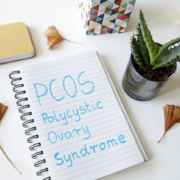If you’ve been diagnosed with PCOS (polycystic ovary syndrome), you are likely familiar with at least a few of its hallmark signs. But did you know that up to half of all women with PCOS are at risk of developing a mental health condition? Since so many mental health challenges go undiagnosed, this means that perhaps some of the most devastating effects of PCOS aren’t even being connected to PCOS.
A quick overview of PCOS
Simply put, PCOS is a reproductive hormonal imbalance. This doesn’t always mean that the ovaries have multiple cysts (though its name certainly does seem to suggest this!) More commonly, signs of PCOS include irregular menstrual cycles, thinning of hair on the head, thicker and darker hair growth on the face, acne, and undesired weight gain.
What’s the connection?
The symptoms described above are the ones most frequently discussed with PCOS. But it is just as important that we discuss the mental health implications of PCOS. These conditions span the gamut from mood disorders to eating disorders. Studies have found a significantly increased risk of major depressive disorder, generalized anxiety disorder, binge eating disorder, obsessive compulsive disorder, and bulimia.
Unfortunately hormonal birth control, often prescribed for the control of PCOS symptoms, has also been linked to depression. This can often be a chicken-egg scenario, where it is unclear which factor led to the mood dysregulation. It’s always best to chat with your healthcare provider about your particular situation!
In years past, people believed that the mental health struggles of PCOS patients were caused by poor body image. It was thought that this poor body image resulted from undesired physical changes such as acne or weight gain. Research has since debunked this belief. In reality, PCOS patients deal with depression in similar numbers, regardless of their body weight or skin condition.
Treatment matters!
Unfortunately, patients have sometimes been told that their PCOS doesn’t need treatment if they are not currently trying to get pregnant. This leaves the mental health implications of PCOS ignored and untreated, which is completely unnecessary!
Depression, anxiety, and other mental health challenges can be difficult to deal with. This can be especially true when you’re dealing with infertility, which has emotional challenges of its own.
When you’re dealing with symptoms of depression, anxiety, or any other mental health challenge, it’s important that you focus on the basics of health. Work on developing proper sleep hygiene, including a regular bedtime and wake-up time. Take a walk around the block and stretch on the floor a bit. Self-care during this time is vital, so don’t be afraid to make time to read a novel or just kick your feet up. Work to reduce stress wherever possible.
Avoid overly restrictive diet plans, and concentrate instead on reducing processed foods. Keep quick snacks in your kitchen, like fresh fruits and veggies that are already cut up, string cheese, Greek yogurt, or nuts available. These are easy to grab on-the-go or when you just don’t have the energy to prepare a meal. (Lack of energy and motivation can often be a very real part of mental health challenges!) There is no “correct” way of eating that is perfectly suited to every PCOS patient, but all can benefit from reducing processed foods.
Many antidepressant medications are safe for use during fertility treatments, but be sure that all your healthcare providers are aware that you are currently trying to conceive.
Don’t try to go it alone!
But don’t try to do it all alone! Reach out to a friend or family member who cares about you. There is also a large array of mental health support groups available, both in-person and online. Find a licensed mental health professional who can help you work through some of the challenges in your life. There are even therapists who specialize in mental health and infertility!
If you have been diagnosed with PCOS, it is vital that you collaborate with your healthcare provider to seek optimal physical and mental health. PCOS is not reversible and currently has no known cure. But you can support your body and mind through lifestyle modifications that can make a huge impact on the way you experience PCOS!
Next steps
Have you been diagnosed with PCOS, or do you believe you may have any of the symptoms mentioned above? Dr. Salem’s unique, integrative blend of alternative and conventional medicine is tailored to suit the individual needs of each patient. This holistic view accounts for both physical and mental wellbeing. We understand that each of these aspects impacts the other.
Reach out to us to schedule a consultation to discuss your options. We look forward to meeting with you!




